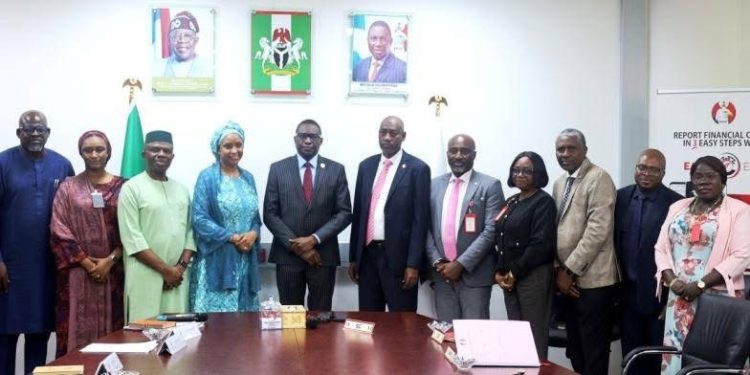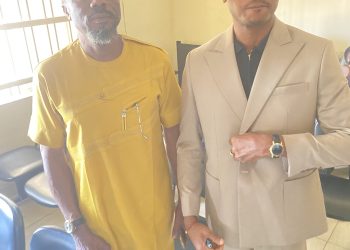By Nkechi Eze
The Presidency has commended the Economic and Financial Crimes Commission (EFCC) for what it described as a “meteoric transformation” from inception to its current stature as one of Africa’s most dynamic anti-corruption agencies, lauding its sustained institutional growth, innovation, and professionalism.
The Special Adviser to the President on Policy and Coordination and Head of the Central Results Delivery Coordination Unit (CRDCU), Hadiza Bala Usman, gave the commendation on Thursday, October 16, 2025, during the formal presentation of the EFCC’s Performance Charter to the Commission’s Executive Chairman, Ola Olukoyede, at the Commission’s headquarters in Abuja.
In an official statement signed by the Commission’s spokesperson, Dele Oyewale, Bala Usman said the EFCC’s evolution over the years reflected a story of commitment, discipline, and institutional excellence.
“You should all be proud of yourselves seeing your trajectory. Some of us have been observing the EFCC’s journey for a long time and I just want to say that collectively your staff and the organization should be very proud of what has been built in these years,” she said. “Every day you visit EFCC, you see improvement. I’m not sure there’s any organization that has grown in the way the EFCC has grown from 2000 to date. This is just to say well done—keep up the good work you’re doing. We are all very proud of you as Nigerians.”
Speaking on the development of the Performance Charter, Bala Usman explained that it was realized through the engagement of experts and technical support from the Foreign, Commonwealth and Development Office (FCDO) and the Partnership for Agile Governance and Climate Engagement (PACE), to strengthen performance evaluation and institutional delivery.
“This document outlines baseline data for measuring the organizational performance of EFCC periodically, monthly, quarterly, and annually based on inputs from its units and departments,” she noted. “It serves as a framework for monitoring and evaluating the Commission’s performance in line with its mandate and both local and international obligations. The Charter is designed to enhance transparency, accountability, and informed decision-making while aligning with the EFCC’s vision, mission, and strategic objectives.”
According to her, the Performance Charter also defines key performance indicators (KPIs) for each department, unit, and zonal office, ensuring measurable progress and clarity of purpose across the Commission. “The next phase will be the validation session, during which EFCC staff will review the draft and provide inputs to finalize the document for implementation,” she added.
In his response, the EFCC Executive Chairman, Ola Olukoyede, commended the Presidential Adviser for her dedication to improving policy coordination across Ministries, Departments, and Agencies (MDAs), noting that previous administrations often struggled with systemic fragmentation due to weak coordination.
“One of the things past administrations lacked was proper policy coordination. Even when individual MDAs were performing well, silo efforts made overall assessment difficult,” Olukoyede observed. “That is why this initiative excites me. I believe so much in policy reforms. Every aspect of our mandate now has a policy driving it, because without that, performance measurement becomes extremely difficult.”
The EFCC Chairman highlighted the Commission’s commitment to evidence-based policymaking and internal reforms, noting that EFCC is not merely an enforcement body but also a research-driven and analytical institution. “We do trend analysis of financial crimes and ensure that every recovery and prosecution aligns with broader national impact,” he said.
Using asset recovery as an example, Olukoyede stressed that the Commission prioritizes transparency and public benefit in its operations. “It’s not enough for us to announce that we’ve recovered funds. We must ensure that such recoveries translate into societal impact. To achieve this, a proper policy coordination system is vital,” he explained.
He, however, called for more attention to the issue of funding and resource allocation, which he described as crucial to the Commission’s operational effectiveness. “You have addressed almost every area of our mandate, but there’s one critical area you’ve not touched—resource allocation. I don’t have money. Maybe you need to come up with a policy that mandates the Attorney General and the Minister of Finance to strengthen our financial base,” he said.
Olukoyede humorously added, “If you just give me five percent of my recoveries, I can assure you that you won’t see me before the National Assembly asking for funds. I recover money but can’t touch it. We need synergy and reforms in this area to help reposition EFCC where it ought to be.”
He reaffirmed his commitment to transparency and reform-driven administration, assuring the visiting team that the Performance Charter would be fully integrated into the Commission’s operational structure. “Rest assured that you will soon see the impact of this effort. We already maintain robust data systems for performance measurement. Before the expiration date for submission of annual reports, ours is always ready. We keep records regularly, leveraging technology and software solutions,” he concluded.















